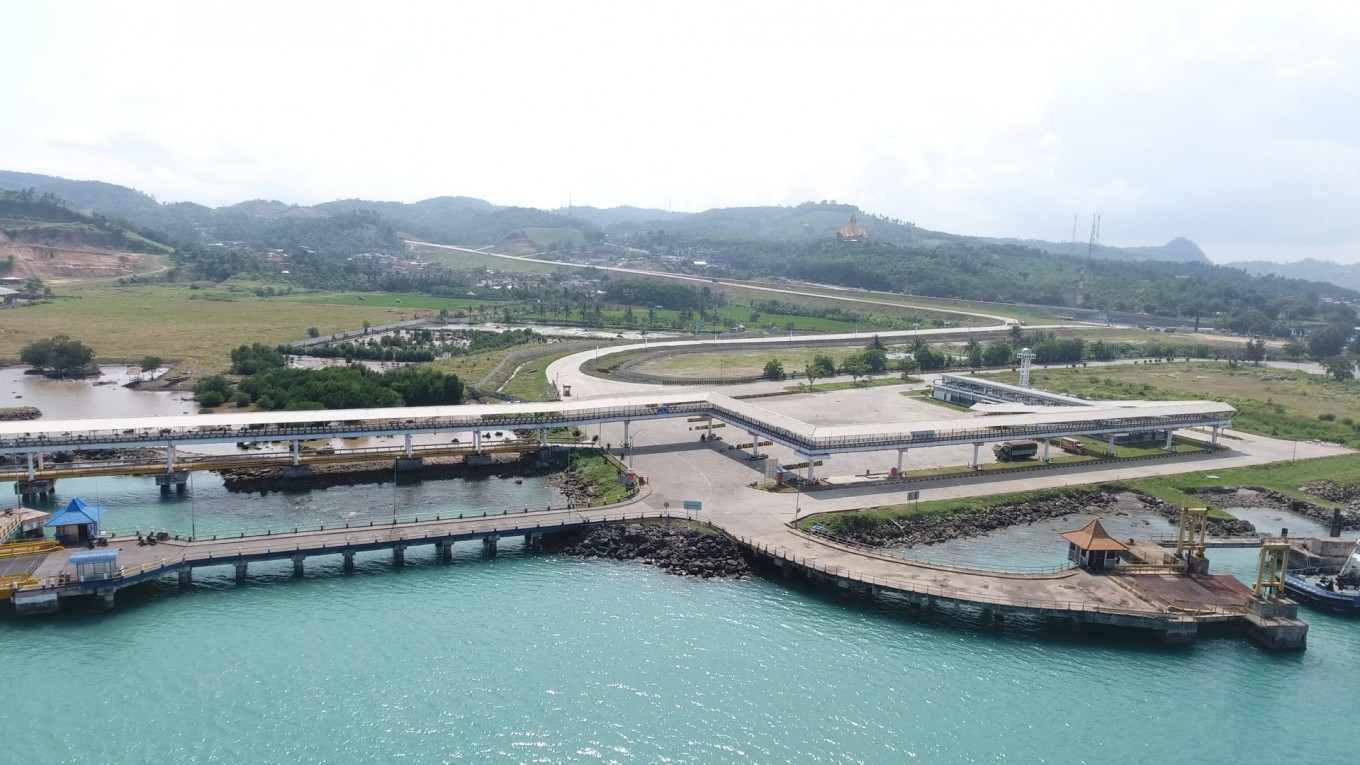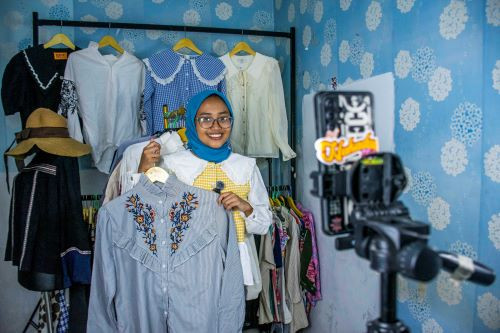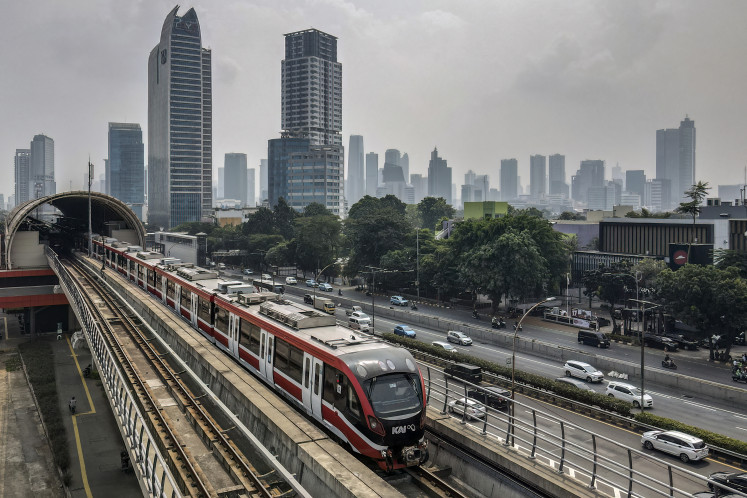Popular Reads
Top Results
Can't find what you're looking for?
View all search resultsPopular Reads
Top Results
Can't find what you're looking for?
View all search resultsPT PII Creative Financing, Fiscal Support, and Role of in achieving Indonesia Maju 2045
Change text size
Gift Premium Articles
to Anyone
I
n order to achieve the 2045 development goals known as Indonesia Maju (Onward Indonesia), one of the government’s main focuses next year is economic transformation. This includes continuing to develop the national infrastructure, improve human resource quality, develop a green economy, use renewable energy, strengthen bureaucratic reform and simplify regulations.
Infrastructure development in 2024 will focus on supporting inclusive and sustainable economic transformation, covering economic drivers (such as connectivity and transportation), energy and electricity, food, gradual and sustainable completion of the Nusantara Capital City (IKN) development project, affordable housing for low-income communities, tourism infrastructure and access to technology, along with the digital transformation.
To support these priorities, the government has allocated infrastructure funding in the 2024 State Budget (APBN) totaling around Rp 423.8 trillion (US$27 billion), a 6 percent increase from the 2023 projected infrastructure budget of around Rp 399.6 trillion.
Moreover, the budget allocation for infrastructure development is aimed at meeting the government’s investment needs. Innovative financing policies involve strengthening the roles of state-owned enterprises (BUMN), public service entities (BLU), sovereign wealth funds (SWF) and special mission vehicles (SMV) as alternative sources of financing support in order to accelerate the priorities of national infrastructure development.
In general, the infrastructure budget allocation from the APBN is insufficient to fully finance Indonesia’s infrastructure investment needs. The government therefore encourages the involvement of businesses in infrastructure financing and in developing various creative financing schemes, such as public-private partnerships (KPBU; also PPP), as well as other alternative financing methods.
Creative financing is an innovation in the field of investment, and it allows various legal funding sources to participate in infrastructure financing. It complements traditional funding sources by introducing innovative financial products, backed by regulatory reforms and fiscal support.
By implementing creative financing schemes, infrastructure projects that were initially financially infeasible become feasible. This approach also allows the use of previously infeasible funding sources.
The use of various creative financing instruments for development programs can also help control central government and SOEs' debt. This in turn reduces dependence on debt financing instruments in the state budget, thus leading to a healthier government balance sheet.
The KPBU scheme is a creative financing solution for infrastructure development that takes into account the limitations of the available funds from the APBN and regional budgets (APBDs), as conveyed by Meirijal Nur, the Director of Separated State Assets at the Directorate General of State Assets (DJKN) of the Ministry of Finance (Kemenkeu), at a media briefing at the DJKN head office on Friday, Dec. 8.
In order to develop a creative financing ecosystem, the government has prepared various supportive measures. One such example is the KBPU scheme to support infrastructure development. This scheme enables the government to prepare support facilities, including project development facilities (PDFs) and the viability gap fund (VGF).
Additionally, the government has introduced the Availability Payment (AP) scheme to minimize the risk of demand from private parties.
Providing these support facilities not only reduces risk but can also make a project financially viable, thereby garnering greater interest and participation from the private sector.
Infrastructure development under the KBPU scheme involves the private sector with government guarantees. This collaborative scheme between the government and business entities involves developing infrastructure for the public interest by partly or fully using the resources of the participating business entity, while the risks are shared between the two parties.
Meirijal noted that infrastructure guarantees are implemented by PT Penjaminan Infrastruktur Indonesia (Persero) or PT PII, also known as the Indonesia Infrastructure Guarantee Corporation, one of the SMVs of the Ministry of Finance. The PT PII’s guarantee covers infrastructure risks that fall under the person in charge of the cooperation project, and is intended to provide certainty and comfort for investors.
The role of PT PII
In order to accelerate Indonesia's infrastructure development, PT PII plays an active role in developing both central and regional infrastructure projects that are planned and developed using KBPU and non-KBPU schemes.
PT PII President Director Muhammad Wahid Sutopo explained that as of the third quarter of 2023, the company had issued infrastructure guarantees for a total of 31 projects under the KBPU scheme. Of these, were designated as National Strategic Projects (PSN) with an investment value of Rp 268 trillion.
The guarantees provided to KBPU projects include public connectivity, better access to clean water, energy conservation, electricity and telecommunications.
PT PII was also assigned to guarantee 16 projects using non-KBP schemes, as well as eight guarantees within the National Economic Recovery for State-Owned Enterprises (PEN-SOE) framework for SOEs affected by the COVID-19 public health emergency. PT PII has fulfilled this mandate and guaranteed a total of 47 projects with an investment value of Rp 474 trillion.
The non-KBPU and PEN-SOE guarantees are PT PII's latest mandates. The non-KBPU guarantees cover the default risk of SOEs that provide loans and/or bonds to support infrastructure development through alternative schemes outside the APBN.
Meanwhile, the PEN-SOE guarantee is provided in the context of post-COVID-19 recovery to labor-intensive SOEs and businesses. This type of guarantee for labor-intensive businesses comes in the form of loss limit support and joint guarantees with the Indonesian Export Financing Institution (LPEI), also known as Indonesia Eximbank, another SMV of the Ministry of Finance.
In managing the risks of KPBU projects, PT PII carries out guarantees at the preconstruction, construction and operation stages. Risks that are guaranteed include discriminatory legal changes (project specific), delays in important approvals, early termination due to government action, delays in providing project land, and risks of payment for services.
PT PII President Director Sutopo also emphasized that the company has a role as a first loss absorber, in which “first loss” is the size of the share from the infrastructure guarantee corporation (BUPI) that has been assigned to provide a government guarantee.
"Through this mechanism, PT PII acts as the first barrier that will absorb the risk of loss due to failed payment. So through this role, PT PII has helped ring-fence the government from the emergence of contingent liabilities and to minimize direct shocks to the APBN," he added.
The presence of PT PII as part of this creative financing ecosystem is also a catalyst for business entities, especially SOEs, as it opens space for creativity and innovation in developing alternative funding sources.
SOEs today are involved in the development of both financially feasible and infeasible infrastructure projects. Even though SOEs are profit-oriented organizations, as they are government-owned, they can also receive assignments from the government.
In view of the large infrastructure financing target, SOEs need to develop innovative, alternative infrastructure funding schemes.
PT PII can serve as an SOE partner to act as a risk guarantor in projects that are financed through loans, as well as a partner in preparing projects and assisting in transactions related to infrastructure projects.
Sutopo added that, in an effort to increase its capacity to provide guarantees, PT PII had accumulated and received Rp 10.65 trillion in state capital injections (PMN) from its founding in 2009 until 2023.
PT PII held assets worth Rp 15.56 trillion in 2022, which is projected to reach Rp 16.43 trillion by the end of 2023. The company's equity amounted to Rp 15.15 trillion in 2022, and it is predicted to grow to Rp 15.96 trillion by the end of this year.
The company has also contributed to state revenues in the form of tax payments and dividends that reached Rp 2.1 trillion in the 2017-2022 period.
PT PII's support in guaranteeing infrastructure projects takes into account the economic impact of those projects. In road infrastructure, the company has contributed to an economic impact of Rp 705 trillion from 14 toll road projects, the preservation of nine national roads and the replacement of 37 bridges on Java. In the telecommunications sector as part of the Palapa Ring project, it has provided an added economic value of Rp 78 trillion by building a cross-island optical cable network spanning 8,479 kilometers, as well as multifunctional satellites connecting 149,400 offline service points across the archipelago, including in frontier, outermost and outlying (3T) regions.
In improving access to clean water, PT PII has provided guarantees for six drinking water supply system (SPAM) projects. With a total flow rate of 15,450 liters/second and serving around 5.9 million people via an estimated 1.18 million connections, these SPAM projects have provided added economic value of Rp 19 trillion.
PT PII's guarantees for infrastructure projects have provided added economic values of Rp 48 trillion in the transportation sector, Rp 0.7 trillion in energy conservation and Rp 8 trillion in the tourism sector.
In closing the media briefing, Sutopo underlined that PT PII was committed to supporting various development agendas in line with the direction of the 2024 APBN. The company aimed to achieve this by prioritizing support for social infrastructure and climate change in 2024, especially in the waste, sanitation and health sectors, as well as by providing support to small-scale, regional PPP infrastructure projects to accelerate the equitable distribution of infrastructure.
PT PII believes that with the continued development and expansion of the creative financing ecosystem, the goal of Indonesia Maju will be ultimately realized in 2045.
Source: The Finance Ministry











